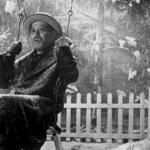The Past, directed by Asghar Farhadi
Two years ago, Iranian filmmaker Asghar Farhadi’s A Separation won the Best Foreign Film Oscar. A beautifully performed film about a troubled marriage, the movie may be most notable for its screenplay, which also received an Oscar nomination.

Farhadi’s new film, The Past, tackles a marriage on the rocks that, like A Separation, takes a winding path into unexpected territory. Just when we think we’ve figured out where the film is going, Farhadi twists the plot as he deepens the mysteries at the heart of his story. That makes for an absorbing drama with complex characters and performances, chief among them from Berenice Bejo—yet another recent Oscar contender (Best Supporting Actress) for her role as Peppy in The Artist. But her sweet, silent performance in that film was no indication of the simmering, intense performance Bejo gives in The Past.
Ahmad (Ali Mosaffa) returns to France from Iran at the request of his wife, Marie (Bejo). In the film’s opening moments, they see each other through airport glass but can’t hear one another—the first of several references to the characters’ inability to communicate and to use their different senses (speech, touch and sound are all crucial in The Past).
What looks at first like it might be a happy, or even bittersweet reunion, is quickly revealed to be something else. Marie tells Ahmad she hasn’t told her children about Ahmad’s visit because “I thought you might let us down at the last minute again.” Clearly, these characters have a past, and it’s put a strain on whatever their current status is.
Ahmad, we learn, left Marie years earlier after a bout of serious depression. Marie has met someone else, Samir (Tahar Rahim), and she’s ready to move on with her life. “I asked you to come for a divorce,” she bluntly tells Ahmad. “I was hoping you’d keep your promise for once.”
It’s not much of a surprise to learn that Lucie is frustrated, in part, by Marie’s relationship with yet another man—someone she fears will leave after a few years, as others before Samir have. (“My mom’s changed guys three times,” she says. “It’s always the same story.”) Greatly complicating things is the fact that the latest boyfriend is a married to a woman who’s in a coma.He does, but while he’s in town, Marie asks him to stay at her house and reach out to her oldest daughter, Lucie (Pauline Burlet, in a great teenage performance). “She loves you,” Marie tells Ahmad—the only direct use of that term that I picked up on in this film about parents, children and companionship—but Lucie has put distance between herself and her mother, and Marie wants Ahmad to find out why.
There’s even more plot, which unfolds slowly and involves an attempted suicide, an illegal immigrant and a batch of emails that ends up, mysteriously, in the wrong hands. Yet there’s pleasure in Farhadi’s treatment of a story that, in other hands, could have played as a cheap soap opera. Instead, Farhadi brings an appropriately sorrowful tone to a story of emotional, physical failings (unexplained depression is a formative aspect of some of the characters’ experience), and he allows his performers, young and old, the space to show different shades of their characters.
Ecclesiastes tells us that “God will bring every deed into judgment, with every secret thing, whether good or evil” (12:14). The characters in The Past are carrying secrets, and the revelation of those secrets lead to surprising outcomes in some cases. But they also veil the story in mystery and keep us wondering about the characters’ past choices and future actions.
Late in the film, a medical professional explains to a character in search of certainty that “in these cases, you can never be sure.” The Past is, in one sense, a study in uncertainty that makes us consider our own decisions and commitments to each other. How do our lives change when we act in ways that lead to divorce? How do we deal with medical problems and persistent conditions that can sap us of hope? What are the consequences of our choices for our offspring?
The Past is a richly textured, superbly acted drama, and yet another indication that Farhadi is one of the best current excavators of the human condition. During a year of superb films, The Past stands out as one of 2013’s richest experiences.












